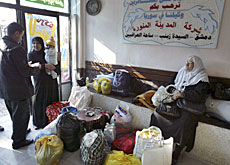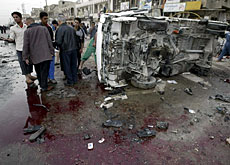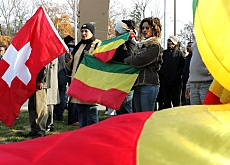Call for action to stem Iraqi refugee crisis

The Swiss authorities have voiced their concerns about the deterioration of the humanitarian situation in Iraq and the plight of refugees.
Millions of Iraqis have fled their homes due to ongoing violence, but the exodus continues – up to 50,000 more every month, according to the United Nations.
“This is a very serious humanitarian question,” Toni Frisch, head of the Swiss Humanitarian Aid Unit, told swissinfo. “The problem is I don’t see any improvement and we must expect it to continue.”
Over recent months the number of Iraqis fleeing their homeland – mainly to neighbouring countries – has risen to two million. More than 1.8 million others have been displaced inside Iraq, according to UN estimates – the region’s biggest migration in nearly 60 years.
The UN refugee agency (UNHCR), which describes the situation as “grave” and “deteriorating”, says that states should respond to the protection needs of Iraqi asylum seekers on their own territory.
It has appealed for $60 million (SFr73.5 million) in emergency aid, and plans to hold an international conference on Iraqi refugees in Geneva in April.
Vulnerable population
With bloodletting spiralling into civil war, life inside Iraq has become even more precarious.
“The living conditions of the population have deteriorated at an alarming rate,” said Barbara Dätwyler of the Swiss government’s Agency for Development and Cooperation (SDC).
“Most Iraqis don’t have access to safe drinking water or sanitation. Child malnutrition is a very serious problem and many children cannot go to school due to insecurity.”
Now, as the violence worsens, increasing numbers of Iraqis are on the move, including many of the people needed to rebuild the country’s infrastructure, run businesses and staff schools and hospitals.
Neighbours under pressure
At least one million Iraqis are said to have fled to Syria, another 750,000 to Jordan, and tens of thousands to Egypt, Iran, Lebanon and Turkey, putting an enormous strain on host countries.
Many refugees live in conditions of acute poverty.
“Women who need to feed their families are said to be particularly at risk,” said Dätwyler. “There have been reports of sexual exploitation and violence.”
Owing to the poor security situation in Iraq, the SDC is still unable to work inside the country, but for a number of years it has been able to respond via organisations such as Première Urgence and the International Committee of the Red Cross.
In 2007 the Swiss authorities are funding water, sanitation and basic health activities, and the building up of local Iraqi agencies through the NGO Coordination Committee Iraq.
In Syria and Jordan the SDC is supporting UNHCR’s Iraqi refugee programme. It has also sent experts to Jordan and plans to do the same in Syria.
Iraqis in Switzerland
While the number of refugees who reach Europe has been comparatively small, some 20,000 applied for asylum in the European Union last year, and the flow is increasing.
But the number of Iraqis seeking asylum in Switzerland still remains relatively low. According to the Federal Migration Office, 3,657 requests are currently under examination.
Last year new requests doubled to 816, but this is small compared with countries like Sweden, which takes in almost half of all Iraqi asylum seekers in Europe – over 9,000 Iraqis.
The migration office does not foresee a major rise in applications, partly because the Iraqi community in Switzerland is so small.
“It is more important to give refugees the possibility to stay in the region,” said Brigitte Hauser, head of communication at the Federal Migration Office.
“Switzerland is just not an easy country to reach,” said Yann Golay, spokesman for the non-governmental Swiss Refugee Council. “The low numbers are also part of the general decline in asylum applications in Switzerland over recent years.”
swissinfo, Simon Bradley

More
Swiss Agency for Development and Cooperation (SDC)
UNHCR estimates that some two million people out of a population of 26 million have left the country since 2003, mainly to neighbouring countries, and more than 1.8 million others have been displaced inside it.
While the numbers who have reached Europe have been comparatively small, some 20,000 applied for asylum in the EU last year, the figure is growing. Sweden, home to around 90,000 Iraqis, takes in the most – 47% of all requests – followed by the Netherlands, Germany, Greece, Britain and Belgium.
The most common routes into Western Europe are by road or boat via Turkey, Greece and the Balkans region. Very few arrive by plane.
Two-thirds of asylum seekers in Switzerland are Iraqi Kurds and 80% young men – women and children rarely manage to get as far as Europe.
According to UNHCR figures, some 500,000 Iraqis fled their homes for other places inside Iraq in 2006.
Number of Iraqis in neighbouring countries: Syria (1 million); Jordan (750,000); Lebanon (40,000); Egypt (20-80,000).
Number of Iraqis seeking asylum in Europe: 2005 (10,600), 2006 (19,000).
Number of Iraqis seeking asylum in Switzerland: 2000 (932), 2001 (1,219), 2002 (1,185), 2003 (1,458), 2004 (631), 2005 (468), 2006 (816).
At the end of 2006, there were officially around 6,000 Iraqis who had been admitted to Switzerland.
SDC’s 2007 budget for Iraq: SFr1.5 million; and SDC contribution to UNHCR refugee programme in Jordan and Syria: SFr2.5 million.

In compliance with the JTI standards
More: SWI swissinfo.ch certified by the Journalism Trust Initiative












You can find an overview of ongoing debates with our journalists here . Please join us!
If you want to start a conversation about a topic raised in this article or want to report factual errors, email us at english@swissinfo.ch.